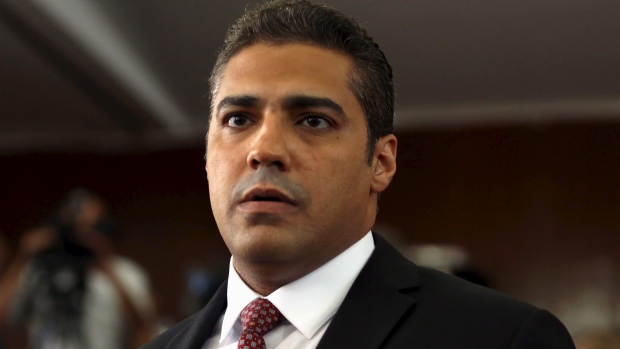Like this article? rabble is reader-supported journalism. Chip in to keep stories like these coming.
Eleven months after his release from an Egyptian prison on bogus charges, journalist Mohamed Fahmy has become a champion for freedom of expression, working with Amnesty International and Canadian Journalists for Freedom of Expression, whose activism helped free him.
Fahmy was in and out of Egyptian prison for more than 400 days — convicted, released, re-tried, convicted again, and then pardoned — triggering a storm of protest internationally, but particularly in Canada. He and his wife started the Fahmy Foundation for Free Press “during the six months I was out on bail,” he said. “I was getting so much attention while I was in prison, and other prisoners of conscience were not.”
Mohamed Fahmy was a boy when his family moved to Canada from the Egypt/Kuwait area. “My dad wanted to live somewhere there was press freedom,” he said. “That’s why we came.” He grew up in Toronto and attended college there, before leaving to work as a journalist in the Middle East.
“My first day on the job as a journalist was the first day of the Iraq war,” he said, in 2003, when he worked for the Los Angeles Times. “I went in with the troops.” The locals were excited to get rid of Saddam Hussein, he said, until reality sunk in. “I saw the mistakes the U.S. administration made too,” he said. “Like disbanding the Iraq army. Many of those fighters joined the opposition. ISIS came out of those soldiers.”
After working with CNN in Iraq for a year, Fahmy arrived in Egypt in early 2011, just in time for the Arab Spring. Public elation was soon followed by disappointment — and then fear. He left CNN and, a month later, became English-language Bureau Chief for Al Jazeera, the Qatar-based leadership of which supported anti-government Muslim Brotherhood.
When Mubarak regained power, Fahmy went to prison. And, “all the extremists I’d been reporting on were there,” he said. “It was a life time exclusive!” All he had to do was survive. “They put me in the notorious Scorpio prison. It was freezing sleeping on the concrete floor and I had a broken shoulder.”
Still, he heard snippets of news that people in Canada were rallying for him. “Listen, if you’ve ever wondered whether signing a petition makes difference,” he said, “It does. It makes a huge difference. My lawyer showed the petition in court and said, ‘Look, this guy has a whole country behind him. He can’t be a terrorist.'”
To pass evening hours, “I started a mock talk show in prison,” he said. “My colleagues and I started interviewing all the prisoners. Every night we would hold the Al Jazeera talk show, interviewing the different prisoners through the eyehole in each cell. We’d get them arguing with each other. My colleagues and I would hold story meetings in the afternoon. Sometimes the talk show had a lot of screaming and yelling. Then one day the warden came in and said, ‘I want this show off.’ I said, ‘What, we’re off the air?'” They were off the air.
When he was finally freed, Fahmy and his wife flew to Canada, where she was amazed by the diversity of people in the airport. He co-wrote the Protection Charter with Amnesty International and presented it to Justin Trudeau, calling for a clear support mechanism for Canadians imprisoned abroad. His foundation lobbied the UN for a Special Envoy to represent freedom-of-expression prisoners, mainly journalists.
Mohamed Fahmy was in Paris to give a speech in November 2015, the month of the horrendous terrorist attack that killed 130 people. His interviews with locals revealed ISIS was encouraging attacks on the French. He worried what that might mean for French Canada, in light of the Parliament Hill attack.
“Then Justin Trudeau turned everything around,” he said. “Trudeau opened up Canada to Syrian refugees, and with one stroke he won the hearts and minds of the Middle East. The kind of Canadians we are makes a huge difference. That’s what makes us one of the safest countries in the world.”
Mohamed Fahmy is writing a book (his third) about his experiences. He holds an adjunct professor position at UBC. His awards include the Peabody, the International Press Clubs’ Freedom of Speech Award, The Writers’ Union of Canada Freedom of Speech award, and Australia’s Voltaire Award.
He and his wife Marwa Omara founded the Fahmy Foundation to fight for journalists and others imprisoned for what they have (allegedly, in his case) said or written. Arab journalist Raif Badawi and York University professor Homa Hoodfar are among the prisoners on the Fahmy Foundation’s top campaigns.
Like this article? rabble is reader-supported journalism. Chip in to keep stories like these coming.



